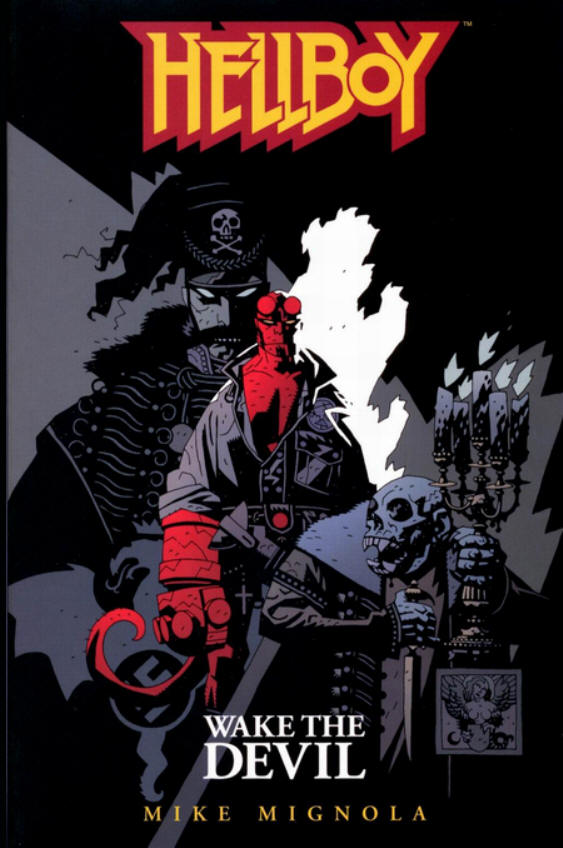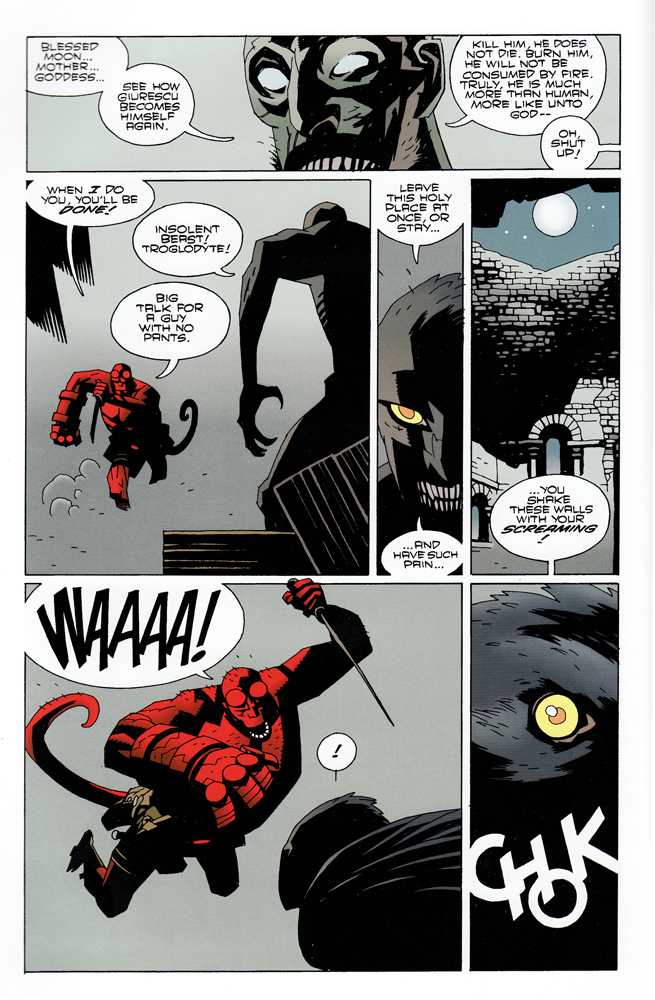Lots of folks have told me to read Mike Mignola, most recently Craig Fischer. So when I saw the second volume, “Wake the Devil”, at the library the other day I figured I’d give it a shot.
And the verdict is…eh. Either the hype is way out of proportion, or “Wake the Devil” isn’t the thing to read. For whatever reason, though, and however you look at it, volume 2 of Hellboy is a thoroughly mediocre piece of genre nothing. Characterization barely exists, while the plot mostly involves various monstrous super villains making ominous portentous speeches and then getting their slimy butts kicked as Hellboy cracks wise and talks tough. If you think Lee/Kirby were geniuses of pulp construction — then, yeah, this still wouldn’t be especially good.
For that matter, Rick Riordan’s Percy Jackson series, which is somewhat similar in its reliance on mythological baddies and in its video-game one big-boss-battle-after-another structure, is significantly wittier and more inventive — and, for that matter, more viscerally suspenseful. Riordan’s characters are kids; they’ve got great powers, but they’re not always sure how to use them, and when they fight monsters they’re scared. In Lost Hero, there’s a scene where one of the kids, Leo, has to rescue his friends from a bunch of cyclops, and finally lets loose with the fire powers he’s been afraid of, and he blasts them.
He pointed one finger in the air and summoned all his will. He’d never tried to do anything so focused and intense—but he shot a bolog of white-hot falmes at the chain suspending the enging block above the Cyclops’s head—aiming for the link that looked weaker than the rest.
The flames died. Nothing happened. Ma Gasket laughed. “An impressive try, son of Hephaestus. It’s been many centuries since I saw a fire user. You’ll make a spicy appetizer!”
The chian snapped — that single link heated beyond its tolerancepoint—and the engine block fell, deadly and silent.
“I don’t think so,” Leo said.
Ma Gasket didn’t even have time to look up.
Smash! No more Cyclops—just a pile of dust under a five-ton block.
I wouldn’t make any claims for that as great literature, but it’s exhilarating and awesome and fun, with a nice Looney Tunes timing, and you care because he was at risk and you’re rooting for him and then he triumphs.
But Hellboy is the impassive undefeatable gunslinger from the beginning. He never seems to doubt his ability to win, and the comic never doubts it either. He just blasts one baddy after another, be they vampire, lamia, or whatever. You never feel exhilarated or impressed, or even interested. The comic is one long crescendo, without any build-up or melody. It starts off irritating, and by the end you just wish it would shut the fuck up. Even the gratuitous deaths of some minor extra side-protagonists can’t elicit much more than a shrug. Some action movie cannon-fodder got offed. Might as well have killed a storm trooper. Ho-hum.
The utter lack of emotional resonance means that the good guys and bad guys become virtually interchangeable. It’s true that the bad guys are clearly labeled as Nazis — but even so, it wasn’t clear why I should root against them. They didn’t actually seem to care about Jews or racial purity from anything that they said; they just wanted to destroy the world. And halfway through, I wanted to destroy Mignola’s world too. If a dragon from the deep rose up and swallowed Hellboy and the earth as well, leaving the second half of the volume just big, blank, black pages, I would have said, hey, the story’s over, I don’t have to read anymore, cool. I’d even enjoy seeing Hellboy have his boasting and wisecracking shoved up his infernal and impassive ass-crack. It’s true that most of the villains were boring and stock too, but their constant defeat did lend them a kind of pathos. The one sad guy who reanimates his friend as a head in a jar only to have them both killed shortly thereafter; Rasputin (yes that Rasputin) whining to his mama at the end because Hellboy beat him again — I mean, I don’t want to read any more about either of them, really. They’re no rat creatures. They just have slightly more personality than Hellboy. It’s not a high bar, but better to clear it than not.
Bad guy boasts. Hellboy boasts. Bad guy gets stomped. Repeat.
The clumsiness and the lack of inspiration in “Wake the Devil” does lead to a kind of brute, Neanderthal genre insight, though. The comic really isn’t about anything but good guys and bad guys hitting each other, those “good guys” and “bad guys” designated by arbitrary fiat. One side is good, the side you root for, which wins. The other is bad, the side you root against, which loses. That’s the algorithm — the ideologies (destroy the world! bathe in blood! whatever!) barely register as anything but an overheated garble of rhetoric. The cops stomp their hellboots on that whining, sneering face for all eternity — and who cares what the face tries to say before the boot comes down? Behold the Superman as anti-fascist fascism — the devil who beats the devil.


